Charter, Comcast Agree on $20B Systems Deal
The smarter way to stay on top of the multichannel video marketplace. Sign up below.
You are now subscribed
Your newsletter sign-up was successful

Comcast ended months of speculation concerning its planned subscriber divestiture, striking a complicated trio of transactions valued at about $20 billion that will solidify Charter as the second largest cable operator in the country while hopefully alleviating regulator fears that Comcast’s planned merger with Time Warner Cable will create an unruly behemoth.
The deal will be completed in three stages: Charter will purchase outright about 1.4 million TWC customers in the first stage and in the second stage Charter and Comcast will swap a total of 1.6 million subscribers in a tax-efficient exchange. In the third leg of the transaction, Comcast will spin off about 2.5 million customers into a separately publicly traded company of which Charter would own about 33%.
While specific markets were not revealed, Charter said the transactions will give it a stronger presence in the Midwest and Southwester portions of the country.
Later, on a conference call with analyst to discuss the deal, Charter CEO Tom Rutledge said the sales would involve Time Warner Cable systems in Ohio, Kentucky, Wisconsin, Indiana and Alabama, while Charter will unload properties in California, New England, Tennessee, Georgia, North Carolina, Texas, Oregon, Washington and Virginia. The spin-off company will hold systems in Michigan, Minnesota, Indiana, Alabama, Eastern Tennessee, Kentucky and Wisconsin.
“Charter cements its footprint in the Midwest, adding TWC assets in Ohio and Wisconsin, while also acquiring the former Insight Communications in Kentucky and Indiana,” wrote Nomura Securities analyst Adam Ilkowitz in a research note. “SpinCo adds some major markets, namely Minneapolis, Detroit, and Indianapolis. Comcast gains control of key media markets in Los Angeles and Dallas, while divesting subs in a shareholder friendly way. We think shareholders will like this deal for both companies, as it accelerates cash generation and rationalizes their regional footprints.”
All of the transactions would take place after Comcast received regulatory approval of its merger with TWC, expected sometime by the end of the year.
“Today’s agreement follows through on our willingness to divest subscribers, while also marking an important step in our merger with Time Warner Cable,” said Comcast chairman and CEO Brian Roberts in a statement “These transactions enable us to deliver meaningful value to our shareholders. The realignment of key cable markets achieved in these transactions will enable Comcast to fill in our footprint and deliver operational efficiencies and technology improvements.”
The smarter way to stay on top of the multichannel video marketplace. Sign up below.
Later, on a brief conference call with analysts Monday, Roberts said that the deal will help create larger regional footprints for both companies, which makes it easier to roll out new products and be more competitive.
By shaving about 4 million subscribers from the rolls, Comcast reduces its ultimate size to under 30% of the television homes in the country after the TWC deal is completed, or roughly the size it was after it completed its AT&T Broadband acquisition in 2002 and its Adelphia Communications deal (with Time Warner Cable) in 2006. That could make the TWC merger easier to swallow for some regulators.
Investors seemed extremely pleased. Charter stock soared as high as $142.70 each Monday (up 9.8% or $12.69 per share) before closing at $140.05, up $10.04 each or 7.7%. Comcast shares closed at $51.70 per share, up 73 cents each or 1.4%. Time Warner Cable stock closed at $140.95, up $1.54 each or 1.1%.
The deal should end any speculation that Charter would attempt to make a counter offer for Time Warner Cable and comes a little more than two months after Comcast bested Charter’s $132.50 per share offer with its own $158.85 all-stock bid for TWC on Feb. 13.
On the conference call, Rutledge said the deal with Comcast was “a good outcome” for all parties involved, giving Charter greater scale and an enhanced footprint. Once the deal is closed, Charter will have about 5.7 million subscribers, up from its current 4 million, and will manage about 8.2 million customers.
Even though Comcast shareholders will own the bulk (67%) of the spin-off, Charter does have the ability to increase that stake after two years.
In a note to clients, MoffettNathanson principal and senior media analyst Craig Moffett estimated it would take about four years for Charter to acquire the remainder of the spin-off, and could do other deals to bulk up its footprint in the meantime.
“Suddenly, the path to 10 to 12 million subscribers – about the size of TWC before the deal-making began – looks relatively clear,” Moffett wrote. “Comcast gets better-clustered systems, more synergies, and more accretion. It’s a rare, but genuine, win-win.”
J.P. Morgan and Paul J. Taubman acted as financial advisors to Comcast and Davis Polk & Wardwell LLP and Willkie Farr & Gallagher LLP are its legal advisors.
Goldman Sachs and LionTree Advisors are serving as lead financial advisers to Charter in connection with this transaction. Guggenheim Securities is also a financial adviser to Charter. BofA Merrill Lynch, Credit Suisse, and Deutsche Bank Securities Inc. are also financial advisers to Charter, and together with Goldman Sachs, are leading the financing for the transaction. The law firms Wachtell, Lipton, Rosen & Katz and Kirkland & Ellis LLP are also representing Charter.
